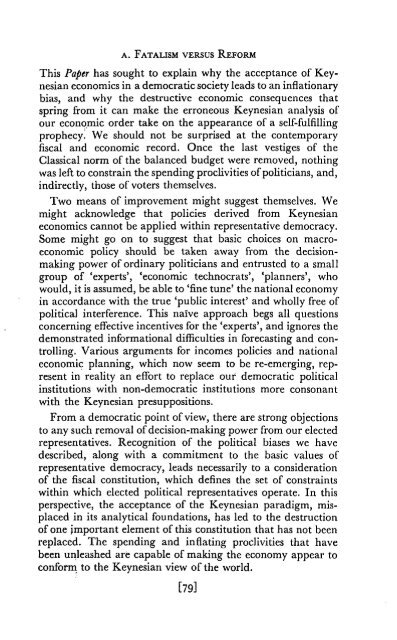THE CONSEQUENCES OF MR KEYNES.pdf - Institute of Economic ...
THE CONSEQUENCES OF MR KEYNES.pdf - Institute of Economic ...
THE CONSEQUENCES OF MR KEYNES.pdf - Institute of Economic ...
You also want an ePaper? Increase the reach of your titles
YUMPU automatically turns print PDFs into web optimized ePapers that Google loves.
A. FATALISM VERSUS REFORM<br />
This Paper has sought to explain why the acceptance <strong>of</strong> Keynesian<br />
economics in a democratic society leads to an inflationary<br />
bias, and why the destructive economic consequences that<br />
spring from it can make the erroneous Keynesian analysis <strong>of</strong><br />
our economic order take on the appearance <strong>of</strong> a self-fulfilling<br />
prophecy! We should not be surprised at the contemporary<br />
fiscal and economic record. Once the last vestiges <strong>of</strong> the<br />
Classical norm <strong>of</strong> the balanced budget were removed, nothing<br />
was left to constrain the spending proclivities <strong>of</strong> politicians, and,<br />
indirectly, those <strong>of</strong> voters themselves.<br />
Two means <strong>of</strong> improvement might suggest themselves. We<br />
might acknowledge that policies derived from Keynesian<br />
economics cannot be applied within representative democracy.<br />
Some might go on to suggest that basic choices on macroeconomic<br />
pohcy should be taken away from the decisionmaking<br />
power <strong>of</strong> ordinary politicians and entrusted to a small<br />
group <strong>of</strong> 'experts', 'economic technocrats', 'planners', who<br />
would, it is assumed, be able to 'fine tune' the national economy<br />
in accordance with the true 'public interest' and wholly free <strong>of</strong><br />
politica] interference. This naive approach begs all questions<br />
concerning effective incentives for the 'experts', and ignores the<br />
demonstrated informational difficulties in forecasting and controlling.<br />
Various arguments for incomes policies and national<br />
economic planning, which now seem to be re-emerging, represent<br />
in reality an effort to replace our democratic political<br />
institutions with non-democratic institutions more consonant<br />
with the Keynesian presuppositions.<br />
From a democratic point <strong>of</strong> view, there are strong objections<br />
to any such removal <strong>of</strong> decision-making power from our elected<br />
representatives. Recognition <strong>of</strong> the political biases we have<br />
described, along with a commitment to the basic values <strong>of</strong><br />
representative democracy, leads necessarily to a consideration<br />
<strong>of</strong> the fiscal constitution, which defines the set <strong>of</strong> constraints<br />
within which elected political representatives operate. In this<br />
perspective, the acceptance <strong>of</strong> the Keynesian paradigm, misplaced<br />
in its analytical foundations, has led to the destruction<br />
<strong>of</strong> one important element <strong>of</strong>this constitution that has not been<br />
replaced. The spending and inflating proclivities that have<br />
been unleashed are capable <strong>of</strong> making the economy appear to<br />
conform to the Keynesian view <strong>of</strong> the world.<br />
[79]












